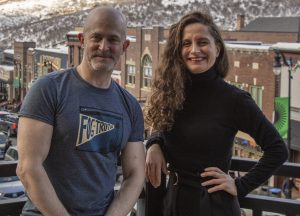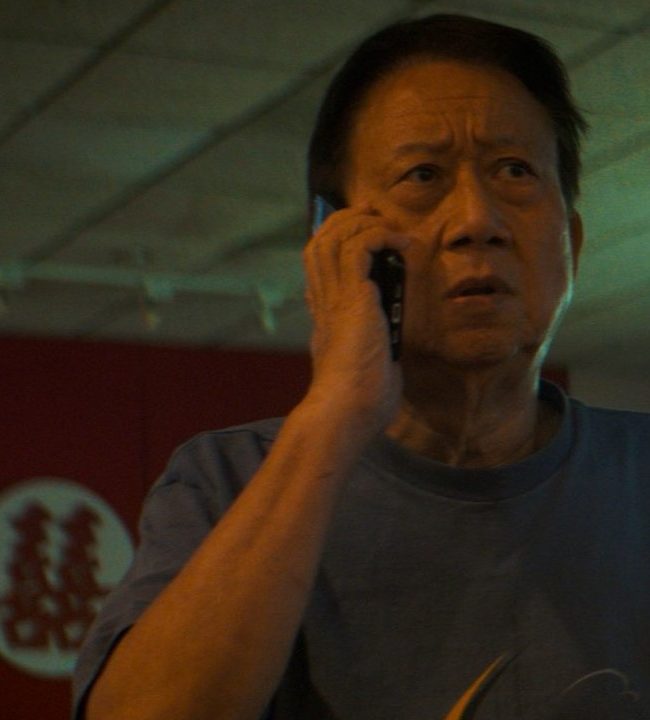A Conversation with Elke Margarete Lehrenkrauss (LOVEMOBIL)

I met with German director Elke Margarete Lehrenkrauss, making her feature debut, on Saturday, January 25, 2020, at the 2020 Slamdance Film Festival, to discuss her magnificent Lovemobil (which I also reviewed), a documentary that takes a raw and close-quarters look at the dispiriting lives of Germany’s foreign sex workers. We follow Uschi, an older former prostitute who now rents camper trailers – the “lovemobils” of the title – to folks like Milena and Rita, the one from Bulgaria, the other from Nigeria, whose stories we also learn. Beyond the affecting nature of the tales, themselves, Lehrenkrauss wows us with the level of trust she earns with her subjects (and their clients, some of whom appear on camera, as well). It’s a truly remarkable work of filmmaking. Here is a condensed digest of our conversation, edited for length and clarity. At times, I have adjusted Lehrenkrauss’s otherwise fine English to make it fit American idioms.
Hammer to Nail: What drew you to the subject of sex workers outside of Wolfsburg, Germany?
Elke Lehrenkrauss: Actually, I am from that town and so these sex workers in those caravans are a childhood memory for me.
HtN: So, they’ve been there for quite a long time, then. Have there always been foreign workers in those caravans?
EL: No, and that’s a big part of my film, too. When I was young, they were all Germans and now they are all from different countries. It was actually a picture of a woman from Africa sitting in this dark forest in the German countryside as a prostitute which made me want to make a film about it, because it’s so strong and so wrong that I just wanted to tell about what’s happening in this world.
HtN: Was that woman you saw Rita, who was eventually in your film?
EL: No, it was a different woman.
HtN: One of the really remarkable things about your film is the access. The trust that these women and their clients and Milena’s friend all give you to allow you in there with your camera is really quite astonishing. How did you gain all these people’s trust?
EL: It took me a very long time to really get close to these women, over the course of three years. I started off knocking on the doors of these caravans and of course nobody wanted to make a film about their lives because most of their families don’t know and so they kind of secretly work there. The first woman who really wanted to take part in my film was Uschi, the one who rents the buses, and she kind of opened up the scene to us. But it still took a lot of time just hanging out there, being present, and then they kind of they let us into their lives, because they saw our deep interest not only in them as a subject for a film, but also as a person. I wanted to make a film about them as people and not only about the topic. I think that kind of was also what they, in the end, wanted.
HtN: So, sex work is legal in Germany, but I imagine there’s still a stigma attached to frequenting prostitutes, no? Was it difficult to find men who would agree to be on camera?
EL: You mean as a client?
HtN: As a client, yes.
EL: No, that was actually the least of our problems, to find men who were willing to perform in front of the camera. We even had applicants who asked us, “Hey, my friend was there filming with you, can I come, too?” It was very, very absurd and the clients who come there do not have a big problem with what prostitution stands for and being on camera. Well, some of them, of course, but most of them were not so afraid of the camera and that really shocked me because it also shows that there is no problem with prostitution, and I think that’s not good for society.

Our Chris Reed and filmmaker Elke Margarete Lehrenkrauss
HtN: Sure. On the other hand, it is legal in Germany, which might explain the lack of shame.
EL: Yes. Well, prostitution is legal, but being a pimp is illegal.
HtN: Isn’t Uschi a pimp, though, or a madam?
EL: Not in the sense of the law and that makes the difference, because she is renting the caravans, and so she is actually a bus renter, like somebody who rents a bus. So she actually has a business which has nothing to do with prostitution.
HtN: Interesting. What about the guy in the club? Isn’t that, in a sense, pimping as well?
EL: No, because he also only gets the money for renting rooms or for renting a bus.
HtN: Makes sense.
EL: That’s the gray zone, the definition by the law, and this law is actually the problem.
HtN: Right. So, you filmed for three years. At what point did you feel comfortable turning the camera on? Did you start right away, filming things that you could? Or in that three-year time was there a year devoted to research? How did that work?
EL: Well, it was one year devoted to research and to actually finding out what this topic was and who these people were that I wanted to make a film about. You have to get a sense of what it’s like to be working in these buses, not as a German, but as somebody from a different country. You really have to listen to the stories and the problems, and that also really changed my view on sex work in Germany, because what they do is actually prostitution, which is a huge difference because they depend on the money, they depend on the people. They are not free sex workers who do it out of pleasure or whatever.
So, finding what I wanted to tell and finding out what is the appropriate way to picture these women was very difficult. Also, the aesthetic way I wanted to do it wasn’t easy, because I wanted to film in a cinematic way, far from journalistic reportage, to have the character of a real movie where you really, as a spectator, sense the atmosphere, what it’s like to be in these buses. That was very important to me so that you could, on the big screen, feel how lonely it is, how fearful.
HtN: What rights do these women have as foreign sex workers in Germany? If they just wanted to pack up and leave, as we see Rita start to try to do, can they do that, or is there debt that they have to pay? Is it a form of indentured servitude?
EL: Legally speaking, they can just pack up and go, but they always have debts to the people who brought them over, who helped them to come over. That is like what I said is the illegal gray zone. The police can’t do anything because these women do not tell them, because they have families back home and their families get threatened by the people who brought them over, so that’s the big problem. The police can’t change anything if the women do not speak out. Not all of them have debts, but many of them do.
HtN: What do you think, in today’s Germany, is the ratio of German to foreign sex workers?
EL: Well, in general, in the big cities there are more sex workers, but it always depends. On this road, however, I would say like 90, 95% are from foreign countries.
HtN: Uschi is such an interesting character because she bridges that divide, since she, herself, was a sex worker in the 1960s and 70s, however long she did it, and now she is basically a madam even though she’s not.
EL: Yes, exactly.
HtN: So, you said she was the first one to do the film. How did you approach her about it?
EL: Yes, she was the first one and she was very open to making this film. We quickly got really close, even though we have different opinions, I think she kind of saw us like her daughters or sons. She was in from the beginning. She saw the film and she didn’t have much of an emotional reaction to it. I thought she would freak out or she would love it or she would want me to change something and she was … OK with it, just OK. You know, not great, not bad, she was just … OK with it. Which was a weird reaction for me as a filmmaker because when you make a film and you show it to your protagonists, it’s like the biggest mountain you have to step over. You just think, “Will they love it, will they hate it?” But she and the other two protagonists were all kind of emotionless about it. It was like, “OK, that’s nice.” Yeah, that was the reaction.
But Uschi, for me, is still one of the most interesting characters in the film because she actually does the job of a man, yet is a woman. This is kind of important to me because it shows that not all men are bad, or that women are always victims. It shows that it is also about hierarchies and about power and the misuse of power and that those who are at the bottom before, when they get up, they do not change the world. They kind of are happy that they are on top now.

A still from LOVEMOBIL
HtN: But it’s also the only system Uschi’s ever known, so it makes sense in her world that you work your way up.
EL: Exactly, and that is the difficult thing about it.
HtN: So, last question: what are Milena and Rita doing now? You said they’ve seen the film, so you’re obviously in touch with them. Are they still doing sex work?
EL: No, they’re both out of it. Forever, I think.
HtN: Oh, that’s good, that’s good! And they had no reservations about exposing their lives to the world? Because Milena didn’t want to tell people, but now she’s in a movie about this.
EL: I think she also used us and the camera to kind of build up the pressure to get out of it.
HtN: That makes sense. It was good therapy, in a sense, talking through all the things she didn’t want to do.
EL: Yes.
HtN: Did her friend help her leave?
EL: No, it didn’t come to that in the end. She just made it out by herself and I think that’s also very good for her.
HtN: Well, good! Congratulations on the film. It’s really quite remarkable and I wish you all good things with it.
EL: Thank you.
– Christopher Llewellyn Reed (@ChrisReedFilm)
Like what you see here on Hammer to Nail? Why not pay just $1.00 per month via Patreon to help keep us going?












Hoschi
So, the whole Lovemobil story turned out to be fake. Check out the major german news outlets for more details on this.
Don R. Lewis
Hello-
I got your comment on Hammer to Nail, I had not heard about this. I google searched it and the articles that came back were in German so I still am confused.
You’re saying the entire documentary is fake?? Is that what the articles say? How did you find out about it?
Thank you!
Don Lewis
Christopher Reed
This is not the full truth. There are a lot of staged elements in the film that are not so labeled within the movie, which I would 100% agree is an unfortunate thing. I am nevertheless surprised by all the people coming out to condemn a small documentary (even if a hybrid one) like this, the truth about which is far more complicated than “it’s all fake.” I just re-interviewed the director, Elke Margarete Lehrenkrauss, about what she did and why, and we will soon publish that interview.
Johnny
Everything was staged. Remember the story of the poor prostitutes that found back to “normal”live due to her film? It’s all a lie, the actors didn’t even have experience in prostitution… they just had to look and act like a clichee… ?
Johnny
So… if you do the re-interview, don’t forget to ask her AGAIN about what happened to the “prostitutes”…
Christopher Reed
As much as I do not disagree that the director should have labeled what she was doing, I am genuinely curious about all of you coming out of the woodwork like this to attack such a small movie. What is your agenda?
In any case, she claims that one of the “actors” was, indeed, a sex worker, just not in the lovemobils, that the older renter of the campers is the real person, and that nothing portrayed on the screen did not come from actual stories of other sex workers. It’s definitely not truthful in its presentation of who is who, but it’s also not a complete fabrication.
Johnny
Yes, of course…. ? ask just any prostitute about it, the whole story is a faked clichee… it is scripted-reality, but comes as a documentary. She returned her german documentary prize after the scam was discovered – cause she knew darn well the whole thing is a lie. My agenda as audience is to see a documentary that is in fact a documentary, and make sure people like her don’t win prizes and steal from other hard working doc-film makers.
Johnny
Story is as real as a cowboy movie.
Johnny
https://youtu.be/ckq2PeQ6VJc
Johnny
Or here:
https://blog.goethe.de/arthousefilm/archives/978-Public-broadcaster-distances-itself-from-the-doc-Lovemobil.html
Christopher Reed
As much as we can all understand how disappointing Elke Lehrenkrauss’ actions may be, posting links to a blog and a YouTube video do not validate all claims against the film. It would be most interesting to force a conversation between all parties, and film it, so everyone is on the record with no chance to claim that they said something other than what they said.
Johnny
I did send you a link to report with evidence and the official statement of the producing group about the film. There is nothing more i can do to inform you. All what the filmmaker is saying in the interview has been proven wrong. She’s a most unbelievable source and has done an immense damage, to everybody involved in the film and to documentarie-makers in general.
Christopher Reed
Understood. My new interview with her will come out next week, and you can see what you think of that and what is true/false.
Johnny
Yes, i can imagine her points: it’s an ART documentary, it’s the fault of the production firm, it’s the general lack of communication, it’s the deadline, it’s her protecting the original prostitutes, it’s not enough money and time …? right?
Johnny
Then again it is interesting how a fictional film about sexual abuse turns into a real human exploitation of the actors, who didn’t know the film was later labeled as documentary.